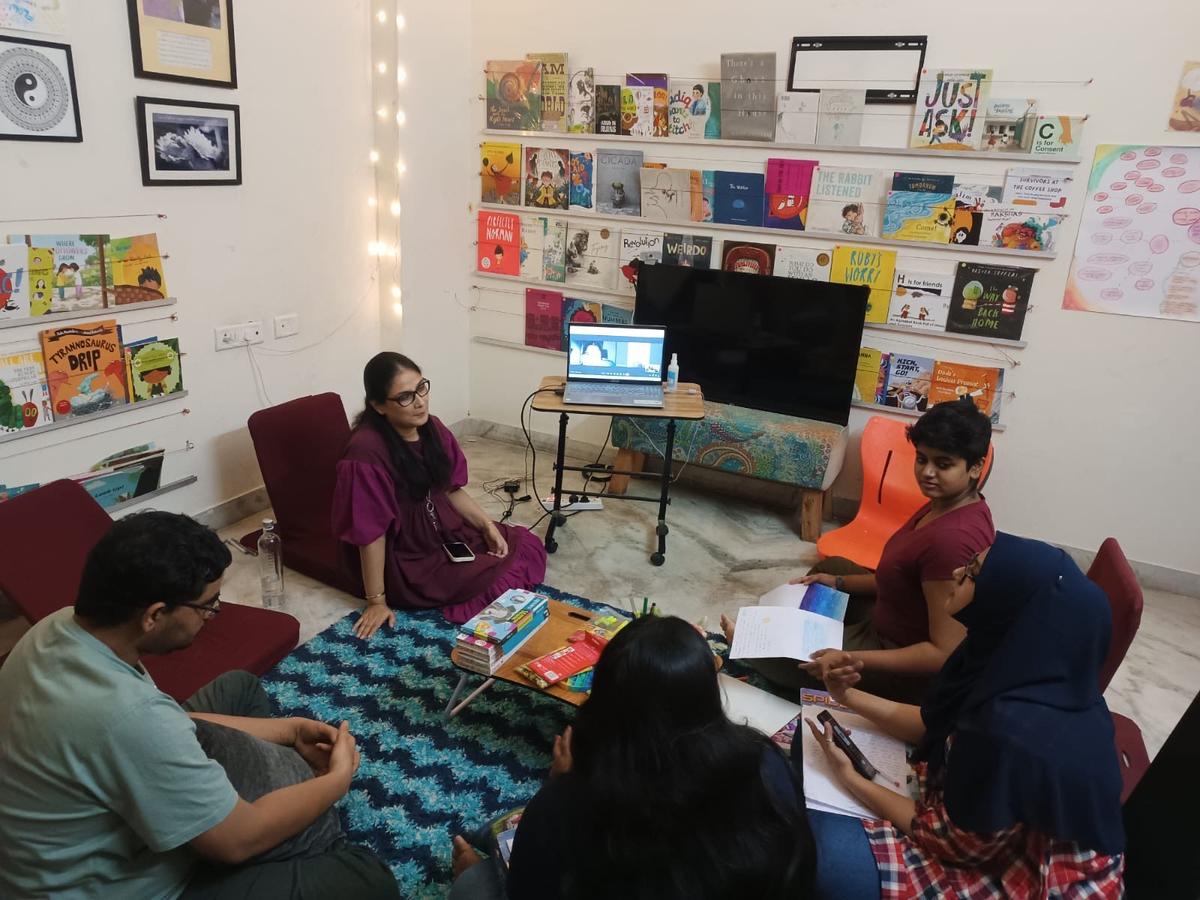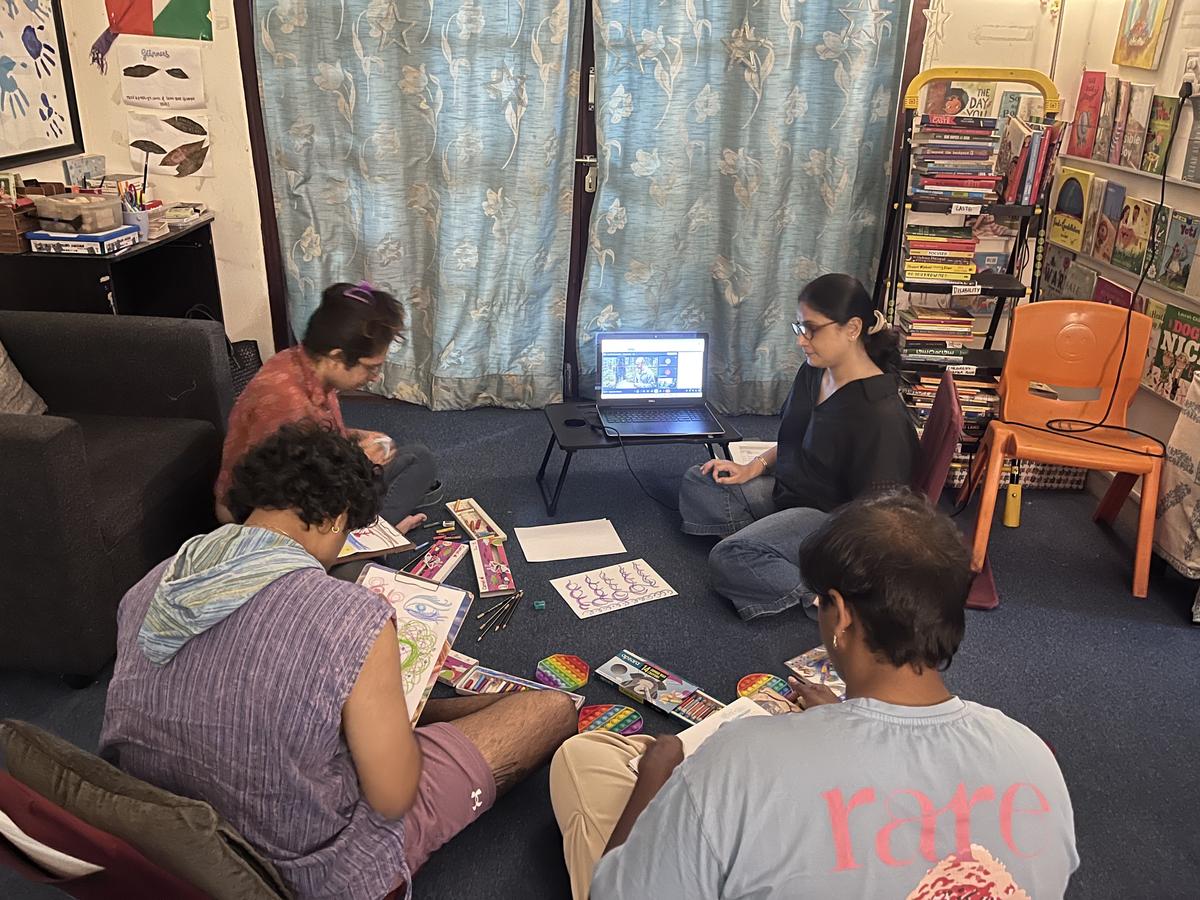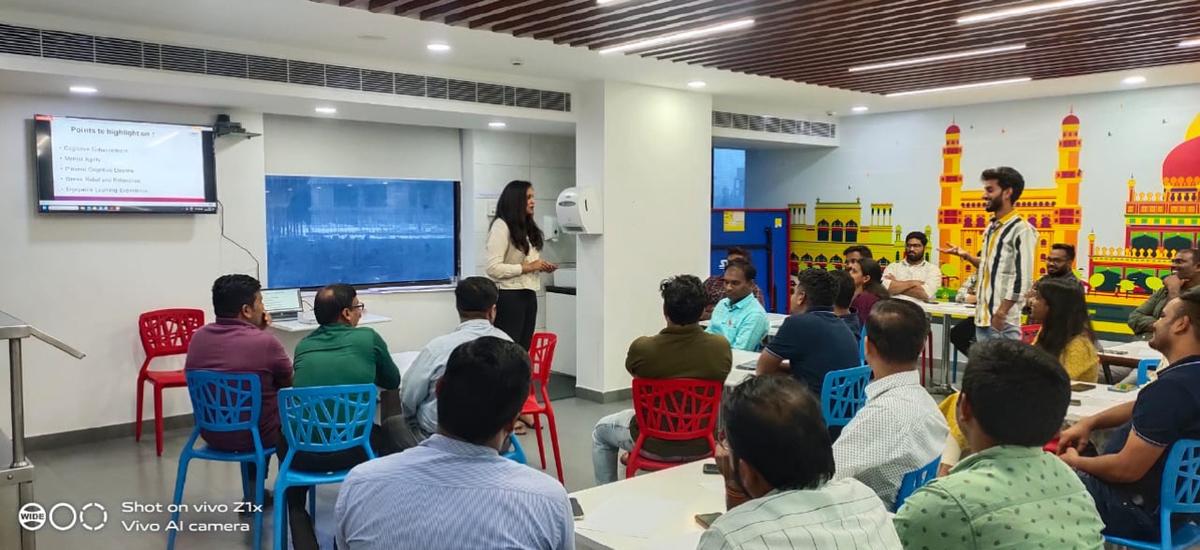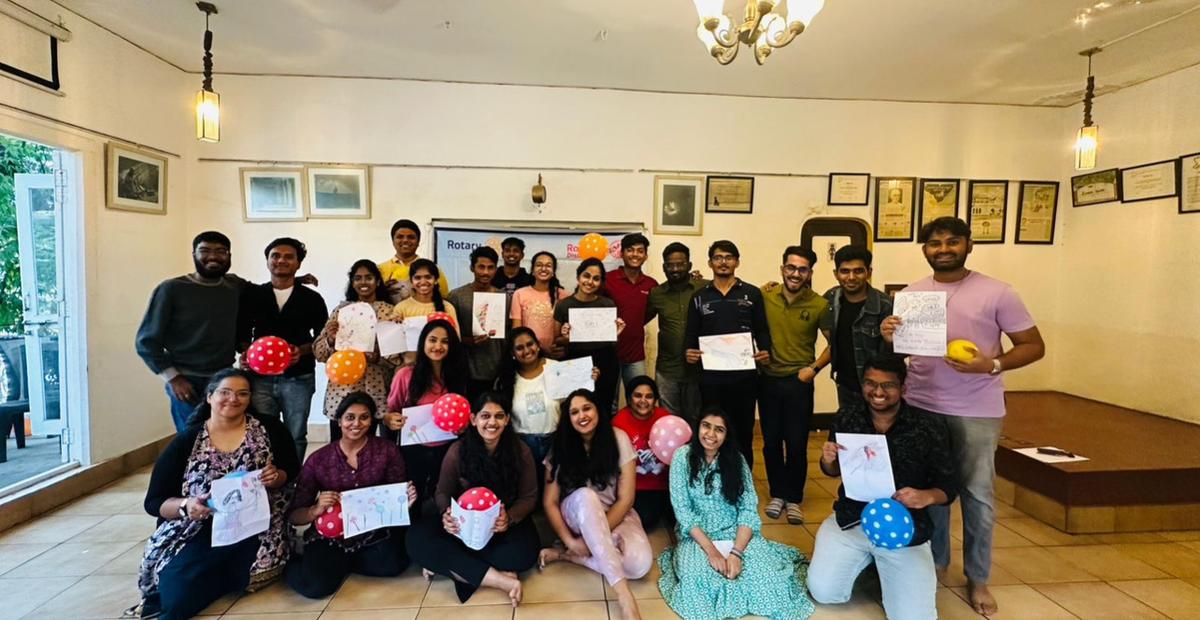There are days in life when we struggle to process intense emotions. While expressing these feelings can offer some relief, the emotional weight often lingers, affecting both our mental and physical well-being. For those who find it difficult to articulate their thoughts, expressive arts therapy offers a powerful alternative. This therapeutic approach helps individuals connect with their inner selves and process their experiences through creative expression.
Expressive arts therapy is gradually gaining ground in Hyderabad. This multimodal practice combines various artistic forms — visual art, reflective writing, poetry, drama, movement, dance, journaling, and music — to support emotional healing across all age groups.
Space for self-expression
Pallavi Banothu with a participant at an an expressive arts therapy session at Align Hub in Hyderabad
| Photo Credit:
Siddhant Thakur; Shot On OnePlus; #FramesOfIndia
Experts in the field conduct solo and group sessions that range between one and three hours to offer a non-verbal outlet for self-expression. Can one navigate life’s complexities through creativity? Yes, says Hyderabad-based Pallavi Banothu. A certified expressive arts practitioner (she did Foundation in Expressive and Creative Arts Therapies (FECAT) and Expressive Body courses from SMArT, Bengaluru), she takes solo sessions online and collaborates with centres aligned with arts in Hyderabad for group workshops.

Her solo sessions typically begin with a ‘discovery call’ — a conversation designed to understand the participant’s current needs, what they hope to achieve, and why they are seeking therapy at this point in time. “It helps me understand how they see their life, their expectations from the space, and gradually we work to build a sense of safety and invite their stories and experiences,” says Pallavi. The practitioner also gauges which art form the individual is drawn to on that particular day. “I use movement therapy, visual art, painting, journaling, elements of psychodrama, mask and puppet work, and even playback theatre. I’m not big on music, but it still has a place,” she adds.
The integration of these art forms unfolds over multiple sessions. The aim is to encourage internal dialogue and help individuals build emotional resources so they can eventually navigate their feelings independently, even without professional assistance.

Sammy Sahni conducts the session at Pause for Perspective
| Photo Credit:
Special Arrangement
Group sessions — typically with up to 10 participants — are designed as safe spaces to explore ‘curiosity, compassion and courage’. Pallavi arrives armed with an eclectic mix of materials: drawing sheets, various types of paints, crayons, sketch pens, brushes, clay dough, printed nature images from magazines, pebbles, kinetic sand, and even soap for blowing bubbles. Dupattas or scarves are used to form safe circles, support dramatherapy, or even craft puppets.
Participants explore different artforms at an expressive arts therapy session being conducted by therapist Pallavi Banothu at Align Hub in Hyderabad
| Photo Credit:
Siddhant Thakur; Shot on OnePlus #FramesofIndia
These sessions begin with introductions and interactive exercises to help participants get familiar with the facilitator, each other, and the space. “We explore how to be present for someone and how to witness artwork created by others during the session,” Pallavi explains. The focus then shifts to the main activity, which enables deeper emotional processing.
This space, she emphasises, is ‘for them to just be’. “When art is involved, we often become performative. The idea here is to shift away from those conditioned beliefs about perfectionism and performance. We open up conversations about what it means for them to simply be here and what support they need to feel safe and comfortable.”
Sessions for therapists

Sammy Sahni conducts a session at Pause for Perspective
| Photo Credit:
Special Arrangement
A non-judgemental space welcomes diverse voices at Pause for Perspective, a counselling and psychotherapy centre in Begumpet. In addition to monthly and bi-monthly expressive arts therapy sessions, the centre also hosts workshops for mental health practitioners as part of its broader programming. Therapist Sammy Sahni explains that insights from these sessions often help other professionals integrate expressive techniques into their personal and clinical practice.
The group sessions are theme-based. A recent one centred on ‘Rest’ incorporated visual art, movement, and embodied practices to cultivate mindfulness. Participants were introduced to the concept of ‘slowing down’, with many describing the experience as ‘cathartic’ and leaving them ‘relaxed and restored’. “When the mind and body are brought into awareness, one begins to recognise the emotions that surface and reflect on how they feel by the end of the session,” Sammy adds.

Rise in sessions

A corporate session by Srini Nelluri
Wellness coach Srini Nelluri takes corporate sessions once a week at at HCL, Amazon and Google. She says “It (demand for sessions) was not the case eight months ago; Now I don’t find the time to take sessions because so many requests come. The demand, she believes, is due to an awareness among people that managing emotions goes a long way in their physical and mental health. “A lot of people now want to sit and feel their emotions and the best way to do it is through expressive arts.”

Corporates, especially in middle management roles, seek such sessions. “With constant work stress, they want places which are fun but also tap into their emotions in a direct way. This kind of self-exploration and healing aids growth personally and brings them back to themselves and that’s what they want.”

Participants display artworks after a corporate session by Srini Nelluri
| Photo Credit:
Special Arrangement
Her two-hour corporate session integrates different artforms involving some dance moves, a lot of music play therapy and mindfulness-based activities with clay-based work and visual arts. “Indians are culturally rich and have many arts. The sessions, a culmination of different arts, bring participants back to their roots.”
A classical dancer, Srini shifted gears first to dance movement therapy and later got trained in expressive arts. “Since I use a lot of visual arts, movement therapy sessions too are like expressive arts for me. Even blinking your eye is movement; making art is movement. It depends on which lens you are looking at.”

Mental health accessibility to all is a challenge and Sammy hopes integrating the arts with other frameworks — a social justice stance, neurodiversity and camping will break the barriers. Make mental health more accessible like listening to music for communities, students, professionals and older people she says. “It should be accessible in a way where people feel comfortable to talk about it and also easily access the information.”
Published – May 06, 2025 02:43 PM is






